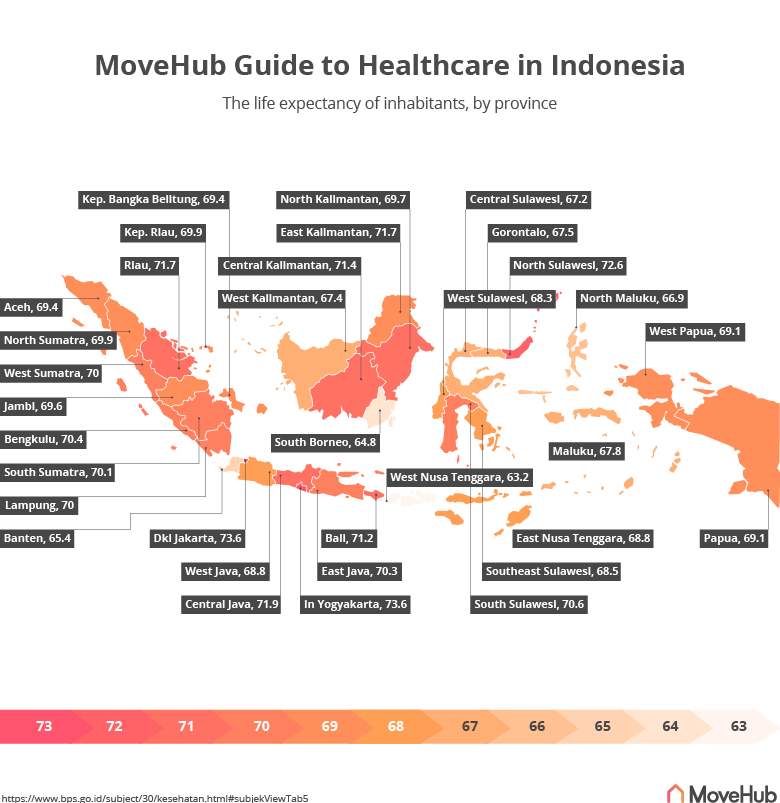Healthcare in Indonesia
✔ Indonesia’s healthcare system is ranked 138th in the world
✔ Private health insurance is recommended so you get the best care available
✔ Expect to pay $92 on average per month for private health insurance in Indonesia
If you’re thinking of moving to Indonesia, ucapan selamat (congratulations)!
This incessantly beautiful nation of 17,500 islands and 270 million people is home to orangutans, the incredibly rare Sumatran rhinoceros, and thousands of awe-inspiring but deadly Komodo dragons – plus nine different UNESCO World Heritage Sites.
But before you become one of the 8,745 American expats enjoying life in Indonesia (United Nations, 2019), you’ll want to learn what kind of healthcare you’ll have access to once you arrive.
And if you want to join the 10.8 million people in Indonesia who have private health insurance, check out our list of recommended healthcare providers. From there, you can request free quotes from whichever company suits your needs.
Indonesian healthcare: key stats
- 0% of Indonesia’s population have private healthcare
- 0average life expectancy
- 0doctors per 10,000 people
What’s on this page?
01 | How does the healthcare system work?
02 | Quality of healthcare
03 | Healthcare for foreigners
04 | Do I need health insurance?
05 | Benefits of private medical cover
06 | How much does health insurance cost?

How does Indonesia’s healthcare system work?
Indonesia has a system of universal healthcare, like most developed nations, called the Jaminan Kesehatan Nasional (JKN).
The programme – which is run by the social security authority, the Badan Penyelenggara Jaminan Sosial Kesehatan (BPJS) – was launched in January 2014, with the ambitious goal of providing basic cover to 100% of its population by 2019.
In the JKN’s first year, it provided coverage to 133.4 million people – about half of the country’s population – and it has continued to grow in popularity.
Though the government missed its target for universal coverage, the current 83.94% rate is still impressive – especially compared to the US, where just 34% of people have public health insurance.
If you need to access health services, you have to first go to a primary care facility, unless it’s an emergency. If necessary, your physician will then refer you on to a hospital or specialist service.
If you’re an Indonesian national or expat who’s lived in the country for at least six months, you must register with the programme.
This allows you to access the following free services:
- Visits to a doctor or clinic
- Basic dental care
- Inpatient care
- Outpatient care
- Referrals to specialised care
- Maternity services, including antenatal, delivery, and postnatal care
- Emergency care
- Surgery
- Long-term treatments like dialysis and chemotherapy
Is healthcare free in Indonesia?
No. As with all universal systems, residents pay taxes which fund the provision of healthcare services.
If you’re formally employed in the country, you’ll automatically pay 5% of your salary to fund public healthcare – 4% from the company, and 1% from you.
However, if you’re an informal worker, an investor, or self-employed, you’ll pay monthly fixed premiums in a three-tiered system. The higher the tier, the better class of hospital ward you receive.
In 2020, with its social security agency facing a deficit of Rp 28 trillion ($1.94 billion), the government raised these monthly premiums sharply – even though a previous price hike was struck down by the Supreme Court.
But whether or not the current premium levels stand, the prices will still look extremely low to Americans.
For the top tier, you’ll now pay Rp 150,000 ($10.40) per month, instead of Rp 80,000 ($5.50).
Second-class premiums cost Rp 110,000 ($7.60) – up from 51,000 ($3.50) – and you can get third-class service by paying Rp 42,000 ($2.90), instead of Rp 25,500 ($1.80).
However, though you’ll almost certainly spend less overall on healthcare than you do in the US, you’ll pay a much higher proportion of the costs.
35% of health expenditure in Indonesia is out-of-pocket, according to the World Bank – more than three times the US’s figure of 11%.
Quality of healthcare in Indonesia
Indonesia’s healthcare system comes 138th in the world, according to a 2018 study published in The Lancet and funded by the Bill and Melinda Gates Foundation.
That puts the country below nations like Sudan, Bangladesh, and North Korea – and 109 spots behind the US, which places 29th.
This lowly status is reflected in almost every healthcare indicator.
Indonesia has three times fewer hospital beds per person than the US, 6.5 times fewer physicians per person, and six times fewer nurses and midwives per person.
If you give birth in Indonesia, you have a one in 565 chance of dying in the process, according to the World Bank – which is nine times higher than in the US.
A child under five years old in Indonesia is 3.4 times more likely to die than they are in the US, and the life expectancy in general is 7.2 years lower in Indonesia than in the US.
Indonesia also spends just 2.90% of its GDP on healthcare, which is less than extremely deprived nations like Chad, Sudan, and the Democratic Republic of Congo.
Over recent years, Indonesia has improved in all these metrics, helped by the creation of the JKN healthcare system.
But until the country’s government pushes more funding into healthcare, it will continue to perform badly compared to other, poorer nations.

The Pura Ulun Danu Beratan temple is stunning, but Indonesia’s healthcare isn’t
Healthcare in Indonesia for foreigners
If you work in Indonesia for more than six months, you are legally required to register for public health insurance with Indonesia’s social security authority, the BPJS.
Your employer is obligated to sign you up if the company has 10 or more staff, so make sure they do.
Self-employed foreigners will pay monthly fixed premiums in a three-tiered system. The higher the tier you choose, the better the hospital ward you get to stay in.
If you’re moving to Indonesia as a retiree without a work visa, you can’t sign up to the BPJS, and should acquire private health insurance.
4% of Indonesia’s population – 10.8 million people – are covered by a private policy, and if you want to join them, check out our list of recommended healthcare providers. From there, you can request free quotes from whichever company suits your needs.
Do I need health insurance in Indonesia?
If you move to Indonesia with a work visa, you must register for public health insurance.
Without a work visa, you won’t be allowed to sign up to the public health system, and should seriously consider acquiring a private medical insurance policy.
Healthcare facilities in Indonesia are inferior to most of the world – and particularly the US – so it’s worth ensuring that you at least get the best coverage and treatment possible by going private.
Benefits of private medical cover in Indonesia
- Shorter waiting times
- Peace of mind
- You’ll receive the highest level of care possible
- The overall quality of health services is low, making it more important that you get the best care around
- Medical equipment is typically more up-to-date
- Fewer unexpected out-of-pocket expenses means you can budget your healthcare in advance
- The staff will be much more likely to speak English
- The paperwork is also more likely to be in English
How much does health insurance cost in Indonesia?
For an individual
You should expect to pay around $1,100 per year for private cover in Indonesia, which comes to $92 per month.
It’s worth getting a few different quotes though, as prices can vary massively.
For a family
To cover a family of four in Indonesia, it’ll cost you around $3,000 per year.
That means you’ll pay about $2 per day, per person to secure peace of mind – and the best level of care in the country, if you ever need it.
What’s next?
If you want to protect yourself and your family with private medical insurance in Indonesia, check out our list of recommended healthcare providers. From there, you can request free quotes from whichever company suits your needs.







